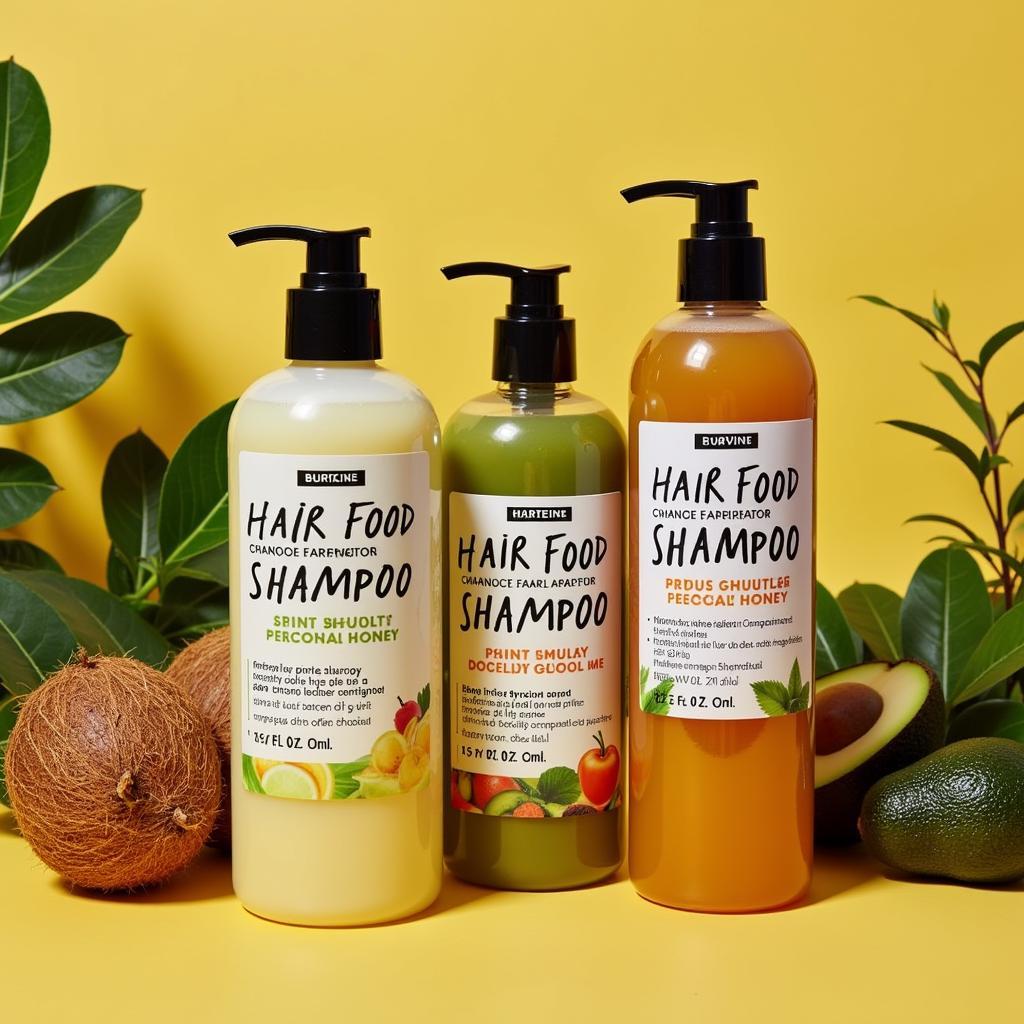Hair Food shampoo has been making waves in the haircare world, but is it worth the hype? With so many shampoo options flooding the market, it’s tough to know what products live up to their promises. In this article, we’ll take a deep dive into Hair Food shampoo, exploring its ingredients, benefits, potential drawbacks, and ultimately, whether it deserves a spot on your shower shelf.
What Makes Hair Food Shampoo Unique?
Hair Food shampoo sets itself apart with its focus on natural ingredients and a “food-as-haircare” philosophy. Think of it as a nourishing smoothie for your scalp and strands. Many varieties boast blends of fruits, vegetables, and oils, promoting themselves as healthier alternatives to conventional shampoos laden with sulfates and silicones.
 Hair Food Shampoo Ingredients
Hair Food Shampoo Ingredients
The Potential Benefits of Hair Food Shampoo
The allure of Hair Food shampoo largely lies in its purported benefits, particularly for those seeking natural hair care solutions:
- Hydration and Moisture: Ingredients like coconut milk, shea butter, and argan oil are known for their hydrating properties, potentially leaving hair softer and more manageable.
- Gentle Cleansing: Free of harsh sulfates, Hair Food shampoos are often touted for their gentle cleansing action, which could be beneficial for sensitive scalps or those with color-treated hair.
- Enhanced Shine and Softness: The inclusion of natural oils can contribute to healthier-looking hair with increased shine and reduced frizz.
- Pleasant Sensory Experience: Hair Food shampoos are celebrated for their delicious scents derived from natural ingredients, turning your shower routine into an aromatic escape.
Navigating the Drawbacks
While the natural approach is appealing, there are a few potential drawbacks to consider:
- Adjusting to the Change: If you’re transitioning from a conventional shampoo, your hair might need time to adjust to the lack of sulfates. Some individuals experience an initial period of greasiness or limpness before their scalp adjusts to the formula.
- Limited Lather: Due to the absence of sulfates, Hair Food shampoos typically lather less than traditional options. This doesn’t mean they aren’t cleansing effectively; it just requires a shift in expectations and perhaps a slightly different technique.
- Not a One-Size-Fits-All Solution: Just like any hair care product, what works wonders for one person might not yield the same results for another. Individual hair types and concerns play a significant role in determining suitability.
Is Hair Food Shampoo Right for You?
 Hair Food Shampoo for Different Hair Types
Hair Food Shampoo for Different Hair Types
Determining if Hair Food shampoo is a good fit depends on your hair type, hair goals, and personal preferences:
- Dry or Damaged Hair: The moisturizing properties of Hair Food shampoos could be particularly beneficial for those with dry or damaged hair seeking hydration and repair.
- Sensitive Scalp: If you experience scalp irritation from harsher shampoos, the gentle nature of Hair Food might provide relief.
- Color-Treated Hair: Many users report that Hair Food shampoos help preserve their hair color vibrancy, likely due to the absence of sulfates.
- Seeking Natural Alternatives: Individuals looking to minimize exposure to synthetic ingredients might appreciate Hair Food’s emphasis on natural formulations.
“For clients with dryness or sensitivity, I often recommend exploring gentler options like Hair Food shampoos,” says renowned hair stylist, Sarah Williams. “The key is to find a formula that addresses your specific needs and incorporates well into your hair care routine.”
Making the Most of Your Hair Food Shampoo Experience
- Start with a Scalp Detox: If you’re switching from a conventional shampoo, consider a scalp detox beforehand to remove any product buildup that could hinder the effectiveness of the Hair Food shampoo.
- Embrace the Low Lather: Don’t be discouraged by the minimal lather. Focus on massaging the shampoo into your scalp to lift away impurities.
- Pair with a Conditioner: While many Hair Food shampoos are designed to be moisturizing, following up with a conditioner from the same line can further enhance hydration and manageability.
- Listen to Your Hair: Pay close attention to how your hair responds to the shampoo. If you experience excessive dryness or greasiness, it might not be the right fit for your hair type.
Conclusion
Ultimately, the question of whether Hair Food shampoo is “good” depends on individual preferences and hair needs. Its focus on natural ingredients, gentle cleansing, and potential to enhance hair health makes it a compelling option for many. However, it’s important to manage expectations regarding lather and be open to the possibility that your hair might need time to adjust. If you’re seeking a natural and potentially nourishing alternative to conventional shampoos, Hair Food could be a delicious addition to your hair care routine.
Ready to learn more about specific Hair Food shampoos? Check out our in-depth reviews:
Let us know if you have any other hair care questions! Our team at Mina Cones Food is here to help you achieve your best hair yet.